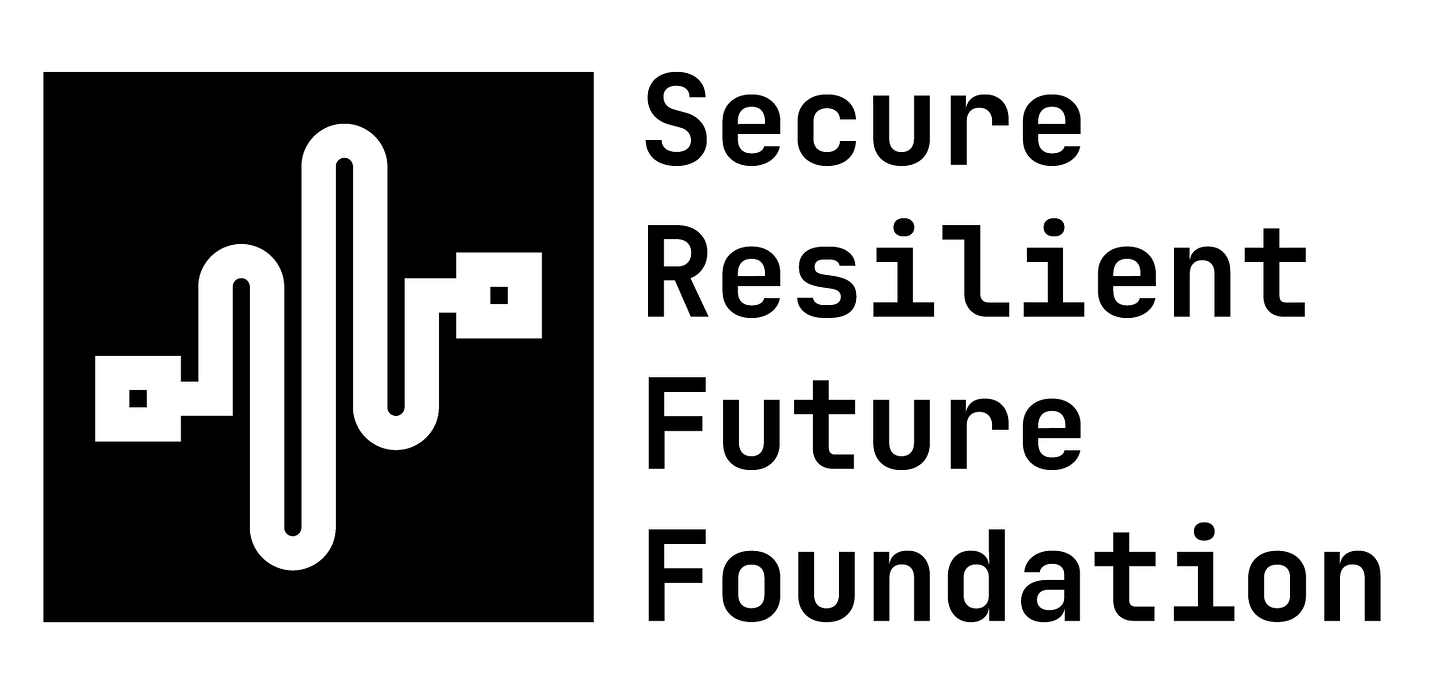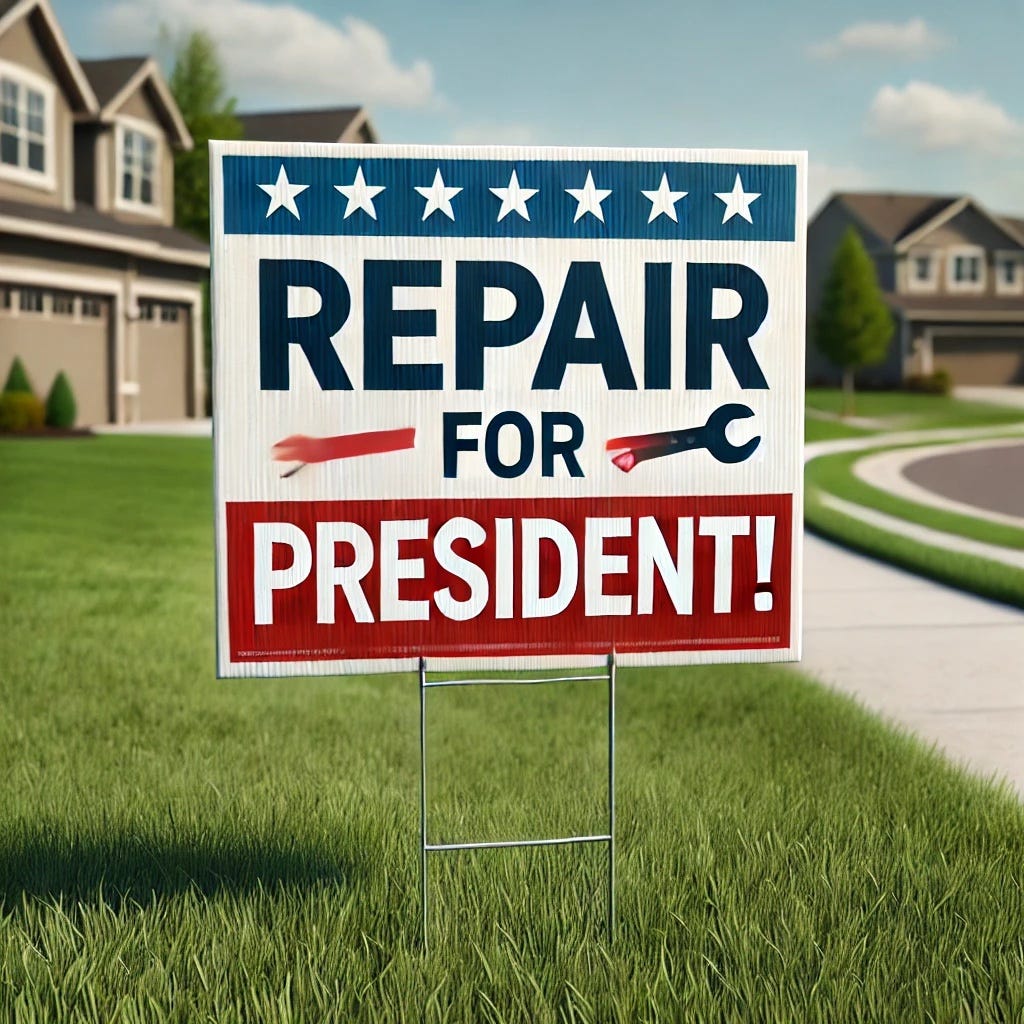Right To Repair On The Campaign Trail As U.S. Election Looms
A right to repair is cropping up on campaign trails as the U.S. election looms. Also: Canada's parliament passes copyright reforms, and California law forces digital media firms to get honest.
Is Right To Repair An Election Issue In the U.S.? You bet!
Tens of millions of voters will head to the polls in the U.S. on Tuesday to elect a new president as well as members of the U.S. House of Representatives, U.S. Senate and state legislatures. With stark differences between the two major parties and starkly different agendas for their candidates - Republican Donald Trump and Democrat Kamala Harris - the vote is being billed as perhaps the most consequential for the U.S. since the election of Abraham Lincoln in 1860.
The campaigning to date has been fueled by a small range of issues: high consumer costs and inflation in the wake of the COVID pandemic, reproductive rights following the repeal of Roe vs. Wade by the U.S. Supreme Court and illegal immigration via the U.S.’s border with Mexico.
In the tempest of debate around those issues, questions about planned obsolescence and a legal right to repair don’t attract much attention. But the need for a right to repair has cropped up on the campaign trail and is being promoted by candidates from both parties and evidence of their commitment to battle big tech and fight for the rights of ordinary consumers.
Here’s a look at some of the races where right to repair has been a topic of conversation:
Top of the ticket: Trump talks McFlurries, Harris Supports Ag Right to Repair
A right to repair has generally not been an issue in the presidential contest - with one possible exception: McDonald’s McFlurry ice cream machines. When the U.S. Copyright Office granted an exemption to the Digital Millennium Copyright Act that would allow McDonald’s franchisees to disable software locks in order to repair broken McFlurry machines, a storm of coverage and attention to the chronically broken devices caught the attention of Republican Candidate Donald Trump. The day after that decision was announced, Trump declared via social media that, if elected to a second term,
“THE MCDONALD’S ICE CREAM MACHINES WILL WORK GREAT AGAIN!”
That’s welcome news but, as Mother Jones noted, it is President Biden’s appointment, Lina Khan, Chair of the Federal Trade Commission, who has been the prime mover behind government efforts to crack down on anti-competitive practices. Khan’s FTC submitted a letter to the Copyright Office in support of making a DMCA exemption for kitchen equipment like the Taylor soft ice cream machines used by McDonald’s.
For her part, Democratic presidential candidate Kamala Harris’s campaign has released a comprehensive “rural agenda” that includes support for small farmers and plans to push for the Agricultural Right to Repair Act, enabling farmers to repair their equipment independently, in addition to other policies like enhanced antitrust enforcement, promoting competition and supporting small farms and processors.
Specifically, she has promised to work with Congress and pass bipartisan legislation to create the "Office of the Special Investigator for Competition Matters" within the USDA to focus on better enforcement of the Packers and Stockyards Act. That is part of a larger Democratic Party effort to appeal to rural voters- a demographic that has moved sharply to the right politically in recent elections.
Trump and the GOP advocate removing federal regulations as a way to promote competition in industries like agriculture, though experts question whether de-regulation won’t spur even more industry consolidation and harsher conditions for small businesses and consumers.
U.S. Senate: Nebraska and Montana Races Highlight Repair
One of the most surprising contests this election cycle has been the contest for a U.S. Senate seat in Nebraska that pits the incumbent, Deb Fischer, a 73 year old seeking her third term in office, against Dan Osborne, a political Independent and professional mechanic who has promoted his support for a right to repair throughout his campaign. As in other campaigns, Osborne is using the right to repair issue to distinguish his advocacy for farmers from the preference inside the D.C. beltway for well heeled lobbyists representing manufacturers. If elected, Osborn said a right to repair will be among his top priorities.
"Right to repair is one of those issues that fly under the radar, that not a whole lot of people know about," Osborn said. "It started with John Deere making their equipment proprietary, and farmers can't work on their own equipment. That's ridiculous. We've got to keep our farmers profitable," he said in an interview with KETV.
A mechanic by profession, Osborne has called a right to repair a “critically important issue.” The right to repair is a “basic freedom that has been whittled away. Without a right to repair their own equipment, farmers and ranchers are effectively locked into costly lifetime contracts with manufacturers.” He has also called out John Deere’s MOUs as falling short of true right-to-repair.
And he’s advocated for a legal right to repair personal electronics and cars.
His opponent, Fischer, has supported federal subsidies for the adoption of precision agriculture technology by U.S. farmers, but has steered clear of the right to repair issue during her time in the Senate. Notably, she did not co-sponsor an agricultural right to repair bill put forward by Democratic Senator John Tester in the 117th Congress in 2021.
In Montana: Senator Tester talks repair
Another Senate race has also raised support for a right to repair: Montana Demoratic Senator John Tester is citing his efforts to pass an agricultural right to repair bill as he fights a tough battle for re-election in an increasingly Republican leaning state. In recent years, Tester put forward a bill to create a right for farmers to fix agricultural equipment. He has also sought more investigative powers for the USDA to look into competitive issues in the meatpacking industry. Polls have shown Tester consistently trailing Tim Sheehy, a former Navy Seal who moved to Montana in 2014 and started an aerial firefighting business.
U.S. House Races: repair cuts across party lines
Down ballot, in races for the U.S. House, the fight to create a legal right to repair is a lower profile issue. However, it has cropped up on the campaign trail in numerous races across the country - often as a way for candidates to prop up their anti-corporate, anti-establishment credentials and be seen advocating for working people.
Marie Glusenkamp-Perez, one of the few Democrats to capture a right-leaning district in 2022, Washington State’s 3rd Congressional district, is caught in a neck and neck race with her opponent from 2022, Republican Joe Kent. Glusenkamp-Perez, who owns an auto repair business with her husband, has been an outspoken advocate of right to repair laws in the U.S. House, co-sponsoring the Fair Repair Act in May of this year.
In Wisconsin, Rebecca Cooke, a Wisconsin businesswoman and entrepreneur is a Democratic challenger to incumbent Derrick Van Orden for Wisconsin’s Congressional District 3. As with other candidates, Cooke cited support for a right to repair as an example of an issue where she would be willing to work across party lines.
“My guiding principle to representing the residents of western Wisconsin is cut through that partisanship and advocate for the issues that so many of our friends and neighbors are facing on a daily basis: the economics of dairy farming in this day and age, the right to repair for those who own heavy equipment and other agricultural implements, ensuring that economic development is focused across rural regions, not just in major U.S. cities,” she said.
As with so many other issues: the outcome of Tuesday’s vote will have a profound impact on the fight for a right to repair. Stay tuned as we unpack the consequences of voters’ decisions in the days ahead -and make sure to subscribe to get early access to premium content.
😠 Got a repair complaint? Tell us about it!
Do you have a complaint about a manufacturer who is blocking your effort to repair your product? The Repair Coalition wants to hear about it! Use the link below to talk about the repair obstacles you’ve encountered.
Other News
Canadian Parliament passes major copyright reforms. Up next: Royal Assent??!
Canada’s legislature passed two bills: C-244 and C-294 on Oct. 31, amending the country’s restrictive Copyright Act to allow farmers to bypass digital locks for repairs and interoperability. There’s just one catch: King Charles of England must approve the changes. (What??!) That’s right: under Canadian law, Royal Assent is required before legislation passed through the House of Commons and Senate can officially become an Act of Parliament.
Bill C-244 was proposed by Liberal MP Wilson Miao and lets users bypass software to diagnose, maintain, or repair equipment like phones, cars, and tractors. Bill C-294 was proposed by Conservative MP Jeremy Patzer and is focused on the issue of interoperability: enabling compatibility between different brands, crucial for agricultural equipment like combine headers. Both bills have strong support from Canada’s agricultural and automotive sectors. In the wake of their passage, the Automotive Industry Association of Canada (AIA), the Canadian Canola Growers and Grain Growers of Canada praised the bills, highlighting the benefits of reduced downtime and increased competitiveness. The AIA said the bill is a good start: taming prohibitive copyright laws that are among the strictest in the world. However, a dedicated auto right to repair bill is still needed to address other issues beyond copyright protections that hamper repair, Auto Service World reported.
New California law forces digital firms to tell consumers they don’t own what they buy
A newly passed law in California strikes at the heart of our skewed and sketchy digital economy: finally requiring digital media firms and online storefronts to be honest with consumers about the nature of their purchase. Namely: that they are licensing software, not buying outright ownership of their digital goods.
The law, AB2426, was signed by Governor Newsom and goes into effect next year. It addresses the problem of “abandonware” in which consumers suddenly lose access to their digital media like books, video games and movies when the license holder withdraws consent. The bill passed the State Legislature with strong bipartisan support was signed into law by Governor Gavin Newsom on September 25th. The legislation requires sellers of “digital goods”, such as movies, e-books, and video games, to disclose to the purchaser that they are only receiving a license to use the digital media. Under the law, companies have to use specific language when selling digital media that specifies license terms or face false advertising fines.
Netflix special explores culture of waste
A new special on Netflix will explore our consumer culture and the dangerous culture of waste that it promotes. Buy Now! The Shopping Conspiracy, directed by Nic Stacey, will air on Netflix starting on November 20th and dives into the manipulation behind consumer habits. We hear from ex-employees from companies like Amazon and Apple as they discuss profit-focused practices. Meanwhile, the documentary highlights how our buying habits impact future generations and the environment. Among those profiled are Kyle Wiens of iFixit who talks about repair restrictions and how the fuel the e-waste epidemic.
Maine group debates auto right to repair
One year after Maine voters passed the nation’s second automotive right to repair law with an astounding 84% approval rate, the state’s Right to Repair Working Group is still in limbo as a working group created to hammer out the role and authority of a new independent entity to oversee vehicle data access debates key questions about how to implement the law, Repairer Driven News reports. Key among them: who will have the right to grant access to data and repair information once access has been authorized by a vehicle owner. The working group must submit findings to the legislature by February 28, 2025. In a meeting on October 31st, Chairman Christopher Taub urged the group to define the entity's purpose before deciding on its structure, funding, and placement. Tim Winkeler, from VIP Tires & Auto Service, emphasized minimizing taxpayer costs and ensuring timely consumer data access.
PIRG calls on FTC to stop letting electronics “spoil like milk”
US PIRG - the Public Interest Research Group - is calling out the growing trend of bricked and abandoned stuff, as devices like fridges, laptops, or security systems suddenly are degraded or become unusable due solely to manufacturers’ arbitrary decisions to stop supporting critical software, rather than natural wear and tear. In an editorial, Lucas Gutterman of PIRG is calling on the Federal Trade Commission to create rules that could ensure transparency in regard to the length of device support, ensure the preservation of core functionality and require tools to support and maintain devices after manufacturer support ends. Gutterman headed up PIRG’s successful campaign to pressure Google to extend Chromebook support to 10 years. That campaign proved collective action can challenge planned obsolescence. As smart devices become ubiquitous, FTC intervention is needed to protect ownership and prevent arbitrary expiration dates, he said.

The art of the kludge: what repairing your stuff teaches you
Charlie Sorrel has a great article over at iFixit on the lessons we learn when we fix our own stuff and how repair builds skills and confidence, especially with tough challenges. His blog post, “Zen and the Art of Never Giving Up” details his first major fix, of an Apple iBook G3. Inspired by iFixit co-founder Kyle Wiens, Sorrel used items like kitchen foil and a heat gun to repair a graphics chip glitch on the iBook. His efforts extended the life of the device for years. In the process, Sorrel learned that fixing tech is achievable, inspiring future writing on repairs.
Alison Johnson writes a similar piece over at The Verge this week about her first ever repair of a smart phone: an HMD Skyline. “I spend a lot of my time using phones, holding phones, being near phones, and considering phones, but I rarely look inside phones. That’s mostly because dismantling a $1,000 device that a company is loaning you is generally considered rude…I’m learning that if you have the right tools on hand, take your time, and consult experts along the way, you can do a lot more than you’d think.”
A $400 plastic valve? The cost of a captured market for truck parts
Chace Barber and the folks over at British Columbia based trucking start-up Edison Motors are posting some inspiring and thoughtful videos about their new equipment and the dire state of the trucking market these days. Among the sources of their ire: a ‘captured market’ for replacement parts. In this video, Barber the CEO talks about the absurdity of a $400 plastic parking brake valve to replace a metal precursor that cost only $20. How did $20 become $400? Barber said planned obsolescence and the high cost of new trucks is driving the abusive practices. Be aware of “plastic junk” and look for long lasting parts that are easy to replace, he says.







